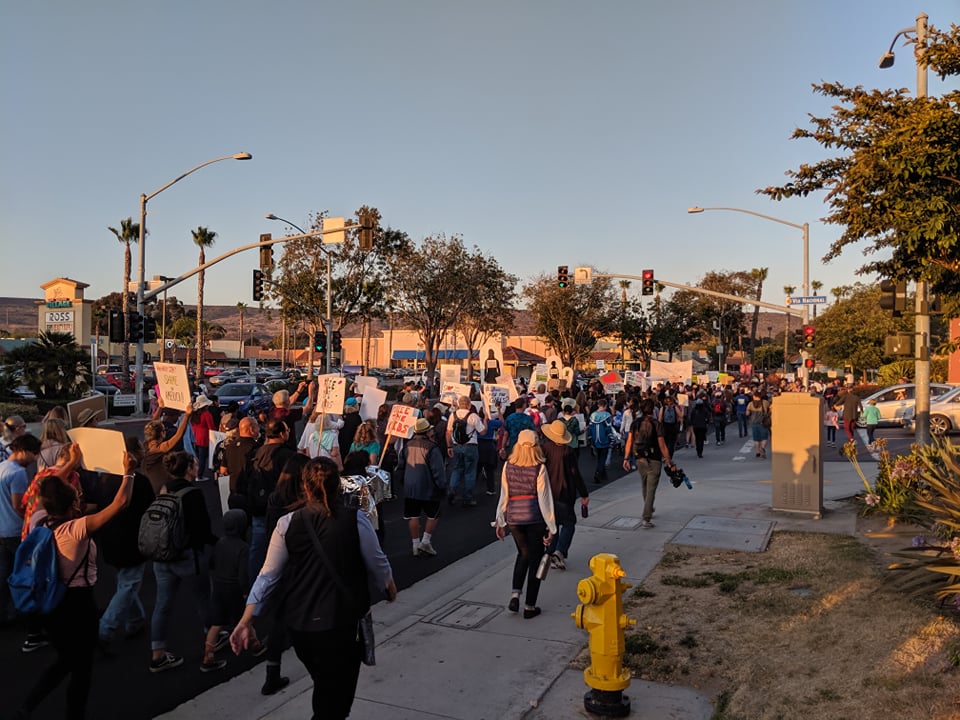
By Mandy Day, Staff Writer
With the threats of ICE raids this weekend hovering over ten U.S. cities, tens of thousands of people congregated across the country to protest the treatment and incarceration of undocumented immigrants and asylum seekers. The raids will target individuals and families who have deportation orders. Coordinated by the newly formed organization Lights for Liberty, more than 800 events took place from Juneau, Alaska to Auckland, New Zealand. While July 12th was a national day of action, future events continue to appear on the Lights for Liberty social media pages.
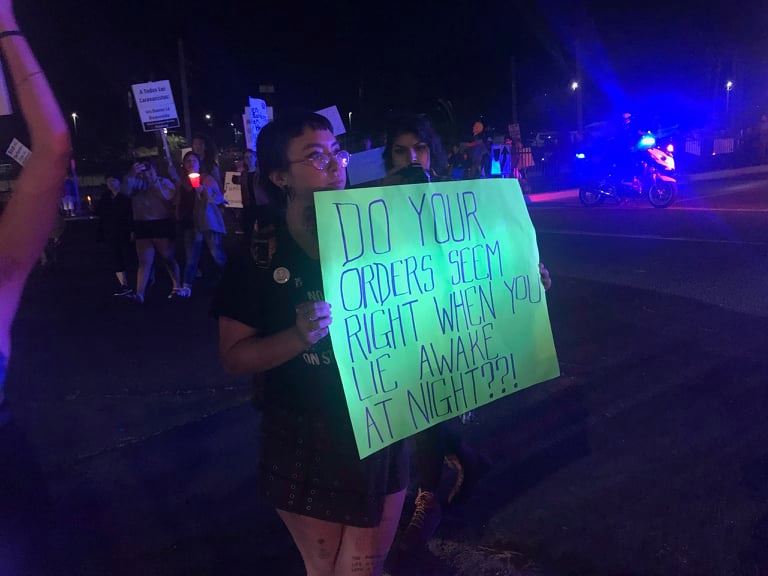
San Ysidro in San Diego County is the busiest port of entry in the world. Thousands marched from a local park to the U.S.-Mexico border to protest U.S. policies targeting undocumented immigrants and people of color. Participants came from all corners of the county of more than three million to march. Home to one of the largest Filipinx communities in the United States, thousands of undocumented Asians and Pacific Islanders call San Diego home and are at risk for being rounded up and deported.
On any given day, tens of thousands of cars and pedestrians cross the border between San Diego and Tijuana. Wait times at the border can be hours long, and every Friday, traffic is snarled for miles leading into Mexico. Demonstrators shut down roadways at the final exit before the border demanding that children missing in the system be found and reunited with their families. Bewildered drivers and passengers recorded the protest, and hundreds of cars honked in solidarity drawing cheers from the crowd. There were calls to abolish Immigration and Customs Enforcement; close concentration camps housing tens of thousands of immigrants; and demands for the U.S. federal government to be held accountable for criminal behavior.
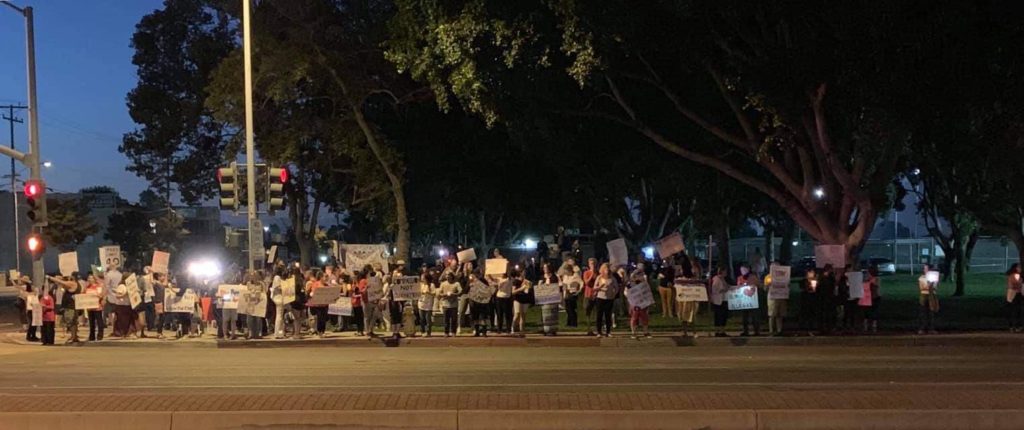
Many attendees taking part in these demonstrations were driven to protest government policies that are eerily similar to what their own families experienced. Many had experiences with their own family separations and unjust incarceration. For Viki Yamashita, a teacher in Long Beach, her participation brought back painful memories of her family’s incarceration in the Second World War. Yamashita’s grandfather was a Buddhist minister who was considered a potential threat and separated from his family. Her entire family was incarcerated during the war except for her father who had been sent back to Japan prior to the U.S. entrance into World War Two.
“I attended and promoted the event relentlessly because of the shocking cruelty being perpetrated on asylum seekers. It is a disgusting repeat of history, because of its intentional cruelty, and I wish more people did this when Japanese Americans were rounded up. Basically empathy and anger were my motivations. I hope to get more people educated, and more importantly active and mobilized for what is to come.”
-Viki Yamashita on her involvement with organizations protesting the treatment of immigrants and asylum seekers
Kimiko Marr, a resident of Santa Cruz County in California, has been involved in fighting for humane treatment of immigrants since news began to break on the treatment of people in these facilities. Marr was on the planning committee for the demonstration at the Dilley detention center in Texas. She traveled to the small town south of San Antonio in March to protest conditions after Mariee Juarez died from an infection she contracted at the facility. Dilley made news earlier this year when reporters shed light on the appalling conditions in which migrants were being kept. Marr talked to AsAmNews about her family’s incarceration in Topaz, Utah during the war and how it has affected her.
“My mother, aunt, uncle, and grandparents were held in Topaz, Utah for 3 years. As a yonsei, I am still trying to wade through the generational trauma that it caused. I would never want any other group of people to be targeted that way. When I look at the WRA pictures of the children in the camps who are now in their late 70s, it still breaks my heart.”
-Kimiko Marr, a fourth generation Japanese American on her family’s incarceration
Yamashita spoke at the Los Alamitos demonstration in Los Angeles and described it as a unifying rally of “love and solidarity” of a few hundred. In San Diego, the event had a less congenial tone to it. Marchers carried life-sized, hand-painted posters of people who have died in custody or at the hands of border patrol agents. Chants were angry and forceful, demanding that children be released from what are essentially prisons. Speakers in San Ysidro directed segments of their speeches at law enforcement who watched protesters closely, some recording them as they passed by. Politicians weren’t welcome in San Ysidro unlike other rallies across the country that gave platforms to members of Congress (or their staffers), and state and local elected officials.
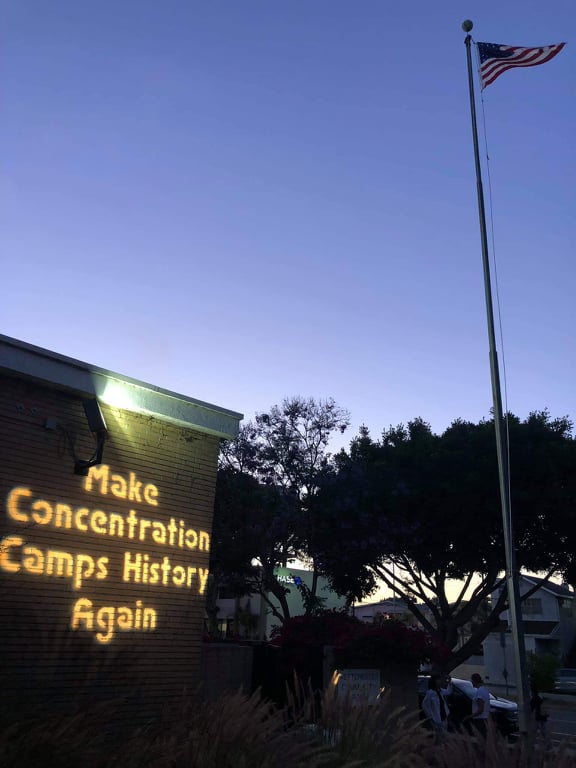
The raids planned for this past Sunday failed to materialize in some cities and were unsuccessful in New York, according to Mayor Bill De Blasio. The constant threat of massive arrests and deportations loom and this is not the first time the threat of raids fizzled before coming to fruition. The raids were reminiscent of dark periods in U.S. history for Marr, “It is very reminiscent of the tactics used during the Mexican Repatriation in the 30s. How many times to we have to make the same mistakes?”
U.S. immigration policy has long been mired in legislative gridlock. Some people seeking to immigrate legally can find a decades-long line, depending on the country of origin. Much of this current problem could be attributed to the denial that decades of U.S. foreign policy and interference in Central America has destabilized a half-dozen countries. Yet, activists have little hope that any substantive reforms could be implemented in this political climate.
“Sadly, I’ve come to believe that nothing changes until the 45th president is out of office. By then, dozens and dozens will be dead. Hundreds, if not thousands, of children will be permanent orphans. Thousands will never be reunited. All of these incarcerated people will be damaged in some way or another for life.”
-Yamashita on her lack of optimism that conditions will improve
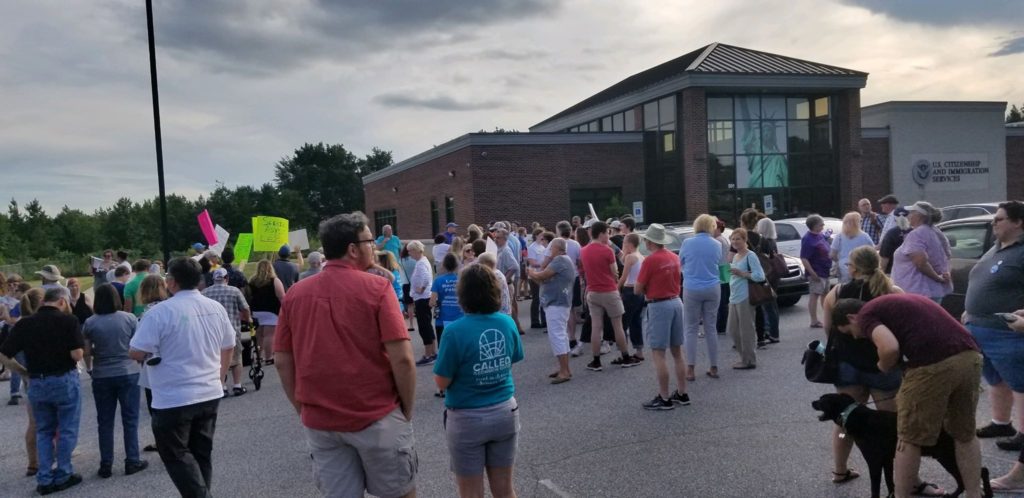
Political divisions have always run deep in the United States but the rhetoric has changed since the invention of the 24 hour news cycle. Even with judicial intervention, change has been slow or non-existent. Voters on both the far left and far right of the political spectrum demand extreme changes to immigration policy and enforcement. Entering into another election cycle may encourage members of Congress and the Executive Branch to reach some kind of deal, or the campaign tactics may stall talks well into the next administration. Until then, millions still live in fear everyday and tens of thousands remain confined in conditions none of us would be willing to tolerate ourselves.
AsAmNews has Asian America in its heart. We’re an all-volunteer effort of dedicated staff and interns. Check out our Twitter feed and Facebook page for more content. Please consider interning, joining our staff or submitting a story

